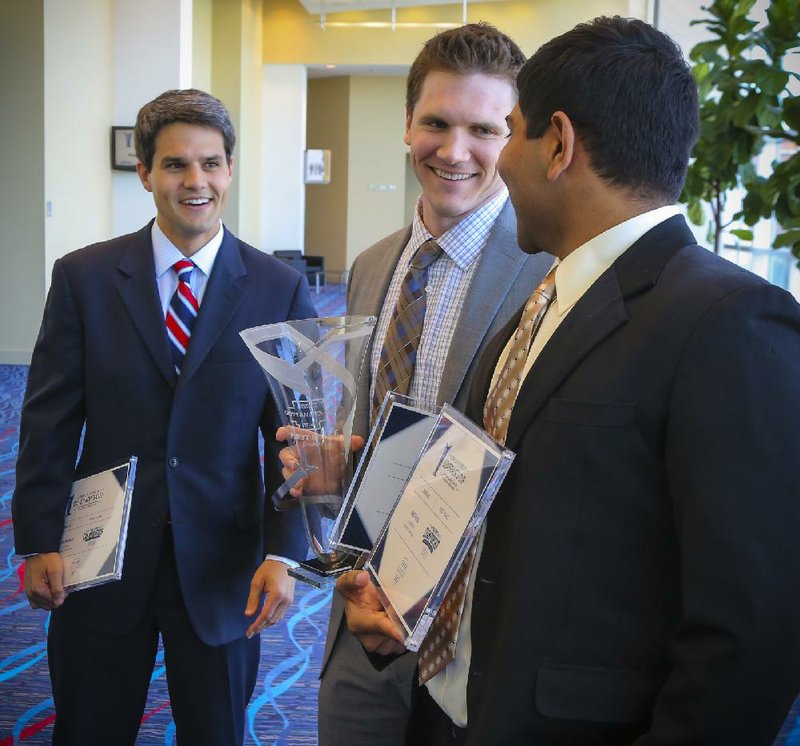Four University of Arkansas students who developed a business plan for a drug that treats age-related macular degeneration won the graduate award in the 14th Donald W. Reynolds Governor’s Cup collegiate business-plan competition Wednesday.
The drug has received a patent and is in the preclinical stages of testing, said Neil Bora, chief executive officer of LumaDrop, the name of the drug and the students’ business, which was awarded $25,000 in the competition.
LumaDrop can be administered as eye drops and thus avert the the need to have regular injections in the eyes, Bora said.
If it receives federal approval, the drug could keep patients with macular degeneration from having to undergo the injections, Bora said.
Ten percent of patients with macular degeneration choose to forgo the painful treatments and accept blindness, said Carol Reeves, the faculty adviser for LumaDrop.
“We think we can develop this business,” Bora said. “We obviously will need some key hires, people who are more familiar with the drug industry.”
LumaDrop will seek federal funding and private funds to develop the business, Bora said.
Bora’s mother, Nalini Bora, is an eye researcher at the University of Arkansas for Medical Sciences, and she developed the drug.
“We’re hopeful that it’s close to [federal Food and Drug Administration] testing in the next year or so,” Neil Bora said.
A total of $154,000 was awarded to teams and faculty advisers in the competition, which was held at the Statehouse Convention Center.
The runner-up in the graduate competition was Datavis, which won $15,000. Datavis promotes software for retailers to replace the bar-code scanner used for stocking shelves. The third-place finisher was HemaNotics, which won $10,000. HemaNotics helps physicians determine a precise dosage of the blood thinning drug Coumadin.
The top three finishers in the graduate competition were from the University of Arkansas. The University of Arkansas has won the graduate competition for the past 11years and had the top three finalists in the graduate category four of the past five years.
The winning team in the undergraduate category was Arleesa from John Brown University, which won $25,000 for its plan to provide customized dolls that emphasize values such as character, self-esteem, diversity and imagination.
The students who created Arleesa said they discovered that some mothers are concerned about the way girls are portrayed in the dolls sold on the market.
“There was always something negative about [the dolls],” said Jeremy Enders, who is with Arleesa. “[The moms] always had to compromise. We realized there may be a need here that no one was meeting. Why not us?”
Arleesa’s dolls come in a variety of skin tones, body shapes and ethnically accurate facial features.
Arleesa’s team needs a capital investment of about $450,000 to develop the business, Enders said.
BioBotic Solutions, which promotes the use of robotics in pathology laboratories, took second place in the undergraduate category. BioBotic Solutions, from the University of Arkansas and Hendrix College,won $15,000. The third-place team was Funding Fathers from John Brown University, which seeks to use a crowd funding method of providing financing for new small business ventures. Funding Fathers won $10,000.
BioBotic Solutions also won the undergraduate award for the best “elevator pitch,” a 90-second presentation about why an investor should put money into the business. Datavis won the graduate award. Each of the two winning elevator-pitch teams received $2,000.
The faculty advisers for each of the top three teams in each category also won $2,000 each.
Reeves and Allen Frazier of Harding University won the first Sam Walls Entrepreneur Educator Award given to two faculty advisers in the competition. They received $5,000 each.
All 12 finalist and semifinal teams in the undergraduate category received an additional $1,000 each. The six graduate finalists also received $1,000 each.
The top two teams in each category will advance to the Donald W. Reynolds Tri-State Award competition in Las Vegas next month. Teams from Oklahoma and Nevada also will compete for a $30,000 first-place prize and $20,000 for second place.
Business, Pages 25 on 04/10/2014
